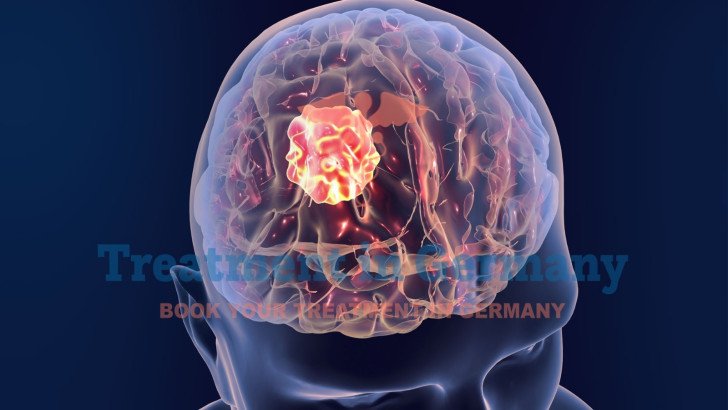
Glioblastoma is a malignant neoplasm that arises from glial cells of the brain. The tumor is heterogeneous and requires a differentiated therapeutic approach.
Brain cancer, encompassing primary tumors like gliomas and metastatic brain tumors, requires sophisticated treatment strategies to improve survival and quality of life. In Germany, cancer treatment integrates cutting-edge therapies such as targeted therapy, immunotherapy, dendritic cell therapy, and advanced surgical techniques, delivered by expert doctors in Germany, including German oncologists and neurosurgeons, in state-of-the-art hospitals.
Brain cancer includes primary tumors (e.g., glioblastoma, meningioma) and secondary metastases from cancers like lung or breast, affecting approximately 8,000 individuals annually in Germany. Risk factors include obesity, diabetes, high cholesterol (hyperlipidemia), autoimmune diseases, and genetic predispositions.
Glioblastoma, the most aggressive type, has a median survival of 12-18 months, while less aggressive tumors like meningiomas achieve 80-90% 5-year survival. Germany’s multidisciplinary approach combines precise diagnostics with innovative therapies to control disease and improve quality of life. Hospitals leverage latest research to deliver personalized cancer therapy.
Accurate diagnosis is critical for effective brain cancer management. Doctors use advanced tools to confirm tumor type, location, and molecular profile to guide treatment.
German oncologists and neurosurgeons in DKG-certified hospitals provide rapid diagnoses, often within days, enabling prompt innovative cancer treatments.
Brain Cancer Treatment Options in Germany
Germany offers a comprehensive range of treatments for brain cancer, tailored to tumor type, stage, and patient health. Hospitals integrate cancer treatment to optimize outcomes.
Surgery
Surgery is the primary treatment for accessible brain tumors, aiming to remove as much tumor as possible while preserving neurological function.
Radiotherapy
Radiotherapy targets residual or inoperable tumors with precision.
Chemotherapy
Chemotherapy, often temozolomide, is standard for glioblastoma, improving survival by 2-4 months in 60% of patients with MGMT methylation. Oral or intrathecal delivery targets tumor cells, addressing high cholesterol or diabetes complications, per latest research.
Targeted Therapy
Targeted therapy addresses specific molecular pathways. Key options include:
Immunotherapy
Immunotherapy enhances immune responses against brain cancer. Checkpoint inhibitors like nivolumab are effective in 10-20% of hypermutated gliomas. Dendritic cell therapy, an innovative cancer, trains dendritic cells with tumor antigens (e.g., EGFRvIII, CMV), boosting T-cell responses. This outpatient therapy, with mild side effects like fever, improves survival by 3-6 months in advanced cases, enhancing cancer therapy.
Viral and Gene Therapies
Oncolytic viruses (e.g., DNX-2401) selectively infect tumor cells, showing 20-30% response rates in glioblastoma trials. Gene therapies targeting TP53 or PTEN are in early stages, advancing innovative cancer.
Clinical Trials and Emerging Therapies
Germany leads in innovative cancer treatments, offering trials for CAR T-cell therapy, neoantigen vaccines, and tumor-treating fields (TTFields), which extend survival by 4-5 months in glioblastoma (EF-14 trial, 2015). Trials show 20-40% response rates in resistant cases, advancing cancer treatment.
Supportive and Palliative Care
Palliative care, including seizure management, corticosteroids, and psychological support, improves quality of life in 80% of patients. Interventional procedures like shunting relieve intracranial pressure in 60% of cases.
Why These Treatments Are Effective for Brain Cancer
Brain cancer treatments succeed because:
Hospitals extend survival by 6-18 months in high-grade tumors and achieve 80-90% control in low-grade cases.
Benefits of Brain Cancer Treatment in Germany
Germany’s cancer treatment offer significant advantages:
Side effects, like radiotherapy-related fatigue or chemotherapy nausea, are managed by doctors, ensuring patient comfort.
Complementary Therapies Supporting Brain Cancer Treatment
Complementary therapies enhance recovery:
These are standard in hospitals, ensuring holistic cancer therapy.
Why Germany Excels in Brain Cancer Treatment
Germany leads in cancer treatment due to:
Germany’s brain cancer outcomes exceed EU averages by 5-10%, reflecting its expertise.
Conclusion
Brain cancer treatment integrates advanced surgery, targeted therapy, immunotherapy, dendritic cell therapy, radiotherapy, and emerging therapies like TTFields, tailored to patient needs. Delivered by expert German oncologists in DKG-certified hospitals in Germany, these cancer treatment control disease and enhance quality of life after treatment. With complementary therapies and trial access, Germany is a premier destination for brain cancer care.
Frequently Asked Questions About Brain Cancer Treatment in Germany
How is brain cancer diagnosed in Germany?
MRI, PET-CT, biopsy, and genetic testing confirm brain cancer and guide cancer therapy in Germany.
What are the new treatments for brain cancer in Germany?
Options include targeted therapy, immunotherapy, dendritic cell therapy, TTFields, and precision surgery.
How much does brain cancer treatment cost in Germany?
Costs vary based on treatment plans; estimates can be requested from medical facilities.
Can brain cancer be cured in Germany?
Low-grade tumors may be curable; high-grade brain cancer is managed with innovative cancer treatments.
How effective are brain cancer treatments in Germany?
Treatments like immunotherapy and targeted therapy extend survival in cancer treatment options.
How experienced are clinicians with brain cancer in Germany?
German oncologists are global leaders in innovative cancer treatments for brain cancer.
How long is the wait for brain cancer treatment in Germany?
Treatment starts within 1-2 weeks, ensuring prompt cancer therapy in Germany.
Are clinical trials available for brain cancer in Germany?
Yes, trials for innovative cancer treatments like CAR T-cell therapy are available.
How does Germany’s brain cancer treatment compare to other countries?
Germany excels with advanced cancer treatment options and superior outcomes.
Can I get a treatment plan before traveling to Germany?
Yes, facilities provide personalized brain cancer treatment plans based on medical records.
For more information or a free consultation, visit our contact us page.
Kindly complete the form below, and our dedicated team will reach out to you promptly. We look forward to connecting with you soon!
Trierer Straße, 56072 Koblenz, Germany

.webp)
 (1).webp)

.webp)
 (1).webp)


.webp)
 (1).webp)

.webp)
 (1).webp)
